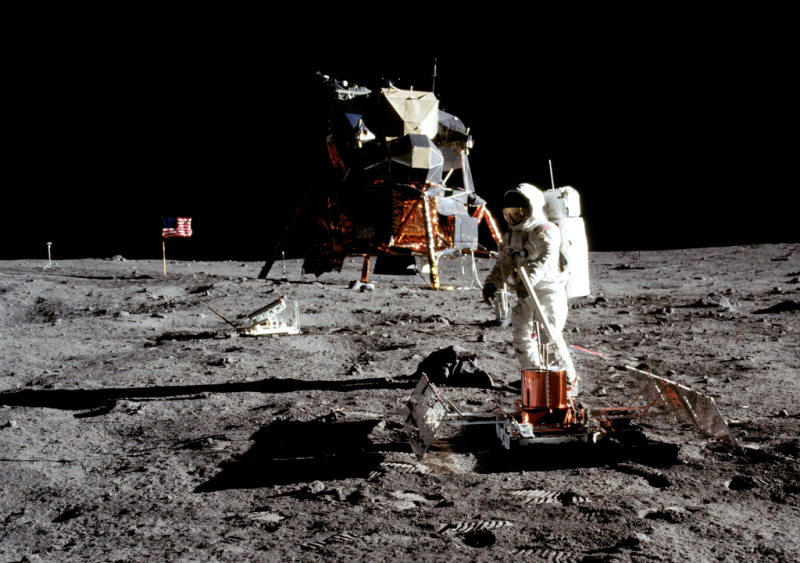
We have seen a recent surge of interest in whether it’s possible to grow potatoes and other plants in Martian soil, but what is the likelihood that a future (manned) lunar base could do something similar? To that end [Space Lab] is developing the LEAF project that will be part of NASA’s upcoming Artemis III lunar mission. This mission would be the first to have Americans return to the Moon by about 2028, using the somewhat convoluted multi-system SLS-Starship-Lunar Gateway trifecta. The LEAF (Lunar Effects on Agricultural Flora) science module will feature three types of plants (rape (Brassica Rapa), duckweed and cress (Arabidopsis thaliana) ) in an isolated atmosphere.
The main goal of this project is to find out how the plants are affected by the lunar gravity, radiation and light levels at the landing site at the south pole. This would be the equivalent of a hydroponics setup in a lunar base. After about a week of lunar surface time the growth chamber will be split up into two: one returning back to Earth for examination and the other remains on the surface to observe their long-term health until they perish from cold or other causes.
This is not the first time that growing plants on the lunar surface has been attempted, with China’s Chang’e 4 mission from 2019. The lander’s Lunar Micro Ecosystem featured a range of seeds as well, which reportedly successfully sprouted, but the project was terminated after 9 days instead of the planned 100 due to issues with heating the biosphere during the brutal -52°C lunar night. Hopefully LEAF can avoid this kind of scenario when it eventually is deployed on the Moon.
















Pretty sure if plant life could exist it would exist without mankind’s intervention. Otherwise you do it in an artificial environment… like a greenhouse… with we have been doing for a very long time
You’ve might have missed the part of growing plants on the moon… the moon, you know, that glow in the dark thingy high up in the night sky… That means it’s very different than what we’ve all been doing for a very long time.
Listen up Elon, Moon before Mars
Elon should personally attempt a manned landing on Venus.
In every area of space endeavor that is worth the funds to do, both commercially and scientifically, UNMANNED robotic explorers are present orbiting Earth and throughout much of the solar system and beyond.
Meanwhile, SPAM in a CAN on the ISS making news with the $2,500+ each chocolate chip cookies they baked there are costing one Perseverance class Mars rover mission PER YEAR just to support. I look forward to its 2030 deorbiting.
Even the race to once again land humans on the dead, dusty ball orbiting us after a well deserved 50+ year hiatus because the scientific return isn’t even remotely worth the cost is back and human spaceflight is, once again, primarily a political prestige race as stated by both the administrator and deputy administrators of NASA:
“she (NASA deputy administrator Pam Melroy) said… “There’s a national posture element to it, to not have humans on orbit after what would be nearly 30 years of continuous presence” when the ISS is retired in 2030.”
GOOD. Use low latency remote human telepresence, robotics, and AI for Earth orbit endeavors.
NASA administrator Bill Nelson: “I don’t want China to get to the south pole first with humans and then say: this is ours, stay out.”
That assumes it is worth the cost and effort to go there in the first place and IF that is ever true and it is somehow profitable enough to do so, commercial firms will do so on their own.
END human spaceflight! It is SO 1960s and mainly exists because of the lobbies making billions from it. And if China puts SPAM on the moon, very publicly welcome them to the club we started over 50 years ago and tell them that we use robots now.
Book: The End of Astronauts: Why Robots are the Future of Exploration
Not that Musk will meet his schedule, as usual, but landing Starships on Mars should be forbidden. They cannot even come close to meeting planetary protection sterilization standards.
Colonizing Mars means contaminating Mars – and never knowing for sure if it had its own native life – November 6, 2018
Excerpt:
Given that the exploration of Mars has so far been limited to [sterilized] unmanned vehicles, the planet likely remains free from terrestrial contamination. But when Earth sends astronauts to Mars, they’ll travel with life support and energy supply systems, habitats, 3D printers, food and tools. None of these materials can be sterilized in the same ways systems associated with robotic spacecraft can. Human colonists will produce waste, try to grow food and use machines to extract water from the ground and atmosphere. Simply by living on Mars, human colonists will contaminate Mars.
Astrobiology Vol. 17, No. 10
Searching for Life on Mars Before It Is Too Late
1 Oct 2017
Abstract excerpt:
Planetary Protection policies as we conceive them today will no longer be valid as human arrival will inevitably increase the introduction of terrestrial and organic contaminants and that could jeopardize the identification of indigenous Martian life.
Agree 100% with Cody:
Humans should not go to Mars… Yet (12:50)
Cody’sLab – 2.18M subscribers
https://www.youtube.com/watch?v=5GjOuqAlFEk
That’s fine so long as humanity is actively working towards defining what needs to be done to be sure and then getting those boxes checked. I fear there is enough drive to get people to Mars that we could eventually populate it, also enough drive to protect the science value of a pristine mars to counter-act that drive. But not enough of a drive to get the job of searching Mars and determining it DOES or DOES NOT contain life that we could ever get the rest going.
If that’s how it is… I prefer to put people over microbes. Sorry.
Besides… native microbes would be adapted for the Martian environment while earth microbes would not. I think the idea earth microbes would outcompete them to the point of being extinct or un-findable is pretty questionable. And if they are truly martian, not just earth microbes that were carried there by a rock… they should be unique enough that we could tell the difference.
Even if we were to send a muck spreader to Mars to cover an acre of its regolith with human or animal turds, it would go nowhere. This place is a lifeless desert covered in toxic perchlorates, bathed in UV and ionizing radiation, with almost no oxygen, ground-level atmospheric pressure comparable to being 40 km above the ground at Earth (twice the U-2 flight height of 20 km) and temperatures reaching −75 °C. A turd full of bacteria and organic matter would be quickly sterlized and over time would decompose into CO2 and minerals.
When people who think like this think of the future… if they think of the future… how do they picture it?
Does it look exactly like today but with a bit of new knowledge at the back of the science books? Does it involve an actual regression? “Yah, we all know what’s up there now but we prefer hunting and gathering now”.
I mean seriously… what is the point of doing anything if there is nothing to work towards? Sorry all the nearby rocks seem to be dead. At least we won’t be conquering any natives this time. Let’s bring life to them!
If Humans don’t eventually go into space than what is the point of space exploration at all? Are you saying we should just stop all space exploration, and if not why if Humans will never go there?
They should try coca plants, if they succeed then the whole thing will easily pay for itself.
“isolated atmosphere” so no regolith simulant this time, it’s aquaponic.
I think the choice of plants is really good. Mustard greens again, makes sense. But now duckweed. Duckweed finds its way into just about every freshwater aquarium I’ve seen. It can propagate rapidly on the top of the water and it’s a nice nutrient sink to balance the animals.
I really want to know what goes in the water. Do they have nitrifying bacteria? Or do they boil the water to sanitize it?